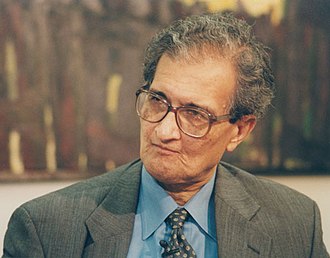The felicitous relationship between human development, preference for democracy, and other positive or modern political values has been argued in extant literature.

Christian Welzel
Welzel, Inglehart and Klingemann (2003) demonstrated that socioeconomic development, emancipative cultural change and democratization constitute a coherent syndrome of social progress – a syndrome whose common focus has not been properly specified by classical modernization theory. They specified this syndrome as ‘human development’, arguing that its three components have a common focus on broadening human choice.
https://nsf.gov/news/news_videos.jsp?cntn_id=111725&media_id=62521
Socioeconomic development gives people the objective means of choice by increasing individual resources; rising emancipative values strengthen people’s subjective orientation towards choice; and democratization provides legal guarantees of choice by institutionalizing freedom rights. Analysis of data from the World Values Surveys demonstrates that the linkage between individual resources, emancipative values and freedom rights is universal in its presence across nations, regions and cultural zones; that this human development syndrome is shaped by a causal effect of individual resources and emancipative values on freedom rights; and that this effect operates through its impact on elite integrity, as the factor which makes freedom rights effective.

Hans-Dieter Klingemann
In a related work, Welzel and Inglehart (2005) examined democratization as an aspect of human development: human development progresses when people attain greater autonomous choice in shaping their lives. Democratization promotes this process in so far as it institutionalizes freedom of choice based on civil and political liberties. This perspective allows one to integrate modernization-based explanations and civic culture-based explanations of democratization under a common theoretical umbrella.
Both types of explanations reflect aspects of human development. Modernization provides socioeconomic resources that increase people’s capabilities to act in accordance with their autonomous choices; and the rise of a civic culture promotes post-materialist values that increase people’s emphasis on autonomous choices.
Linked through their common focus on autonomous human choice, socioeconomic resources and post-materialist values provide overlapping sources of pressure for the growth of freedom. Within the limits set by the extent to which freedom is not yet present, socioeconomic resources and post-materialist values are conducive to the growth of political freedom in interchangeable ways. These hypotheses are tested against the massive wave of democratization processes that occurred from the 1980s to the 1990s, using data from 62 nations of the World Values Surveys. We find that democratization is driven by social forces that focus on the growth of autonomous human choice, reflecting human development. From this perspective, modernization-based and civic culture-based explanations of democratization are manifestations of the same theme: the expansion of autonomous human choice.
It is obvious that a culture of dependence and fear reflects scarcity of socio-economic resources and instrumental/materialist values. The love, nay need for, of a strong leader, betrays a society that is fundamentally authoritarian even if garbed in democratic integuments. The newest term for this socio-cultural complex is offered by North, Wallis and Weingast (2010): the natural state. For the trio, the natural state is a limited access society that limits violence by political manipulation of a few powerful actors but doing so hinders both economic and political development. In contrast, modern societies create open access to economic and political organizations, fostering political and economic competition. And this is supposedly good!

Amartya Sen
The Indian economist-philosopher Amartya K. Sen (2000) raised the ante and argued that freedom is both the end and most efficient means of sustaining economic life and the key to securing the general welfare of the world’s entire population. Releasing the idea of individual freedom from association with any particular historical, intellectual, political, or religious tradition, Sen demonstrated its current applicability and possibilities. In the new global economy, where, despite unprecedented increases in overall opulence, the contemporary world denies elementary freedoms to vast numbers–perhaps even the majority of people–he concludes, it is still possible to practically and optimistically retain a sense of social accountability.
In a newer book, Welzel (2013) presented a more comprehensive theory of why human freedom gave way to increasing oppression since the invention of states–and why this trend began to reverse itself more recently, leading to a rapid expansion of universal freedoms and democracy. Drawing on a massive body of evidence, the author tests various explanations of the rise of freedom, providing convincing support of a well-reasoned theory of emancipation. Welzel’s study demonstrates multiple trends toward human empowerment, which converge to give people control over their lives. Most important among these trends is the spread of “emancipative values,” which emphasize free choice and equal opportunities. He author identifies the desire for emancipation as the origin of the human empowerment trend and shows when and why this desire grows strong; why it is the source of democracy; and how it vitalizes civil society, feeds humanitarian norms, enhances happiness, and helps redirect modern civilization toward sustainable development.
In sum, the human development sequence (HDS) theory, proposed by Inglehart and Welzel (2005) is one of the most prominent modernization theories (Wucherpfennig and Deutsch 2009), stating that economic development, changes in emancipative cultural values and democratization are intimately linked. These three processes are hypothesized to follow a common causal direction, with economic resources providing the means for emancipation, which in turn provides motivation for more democratic institutions. Over time countries undergo a transition as their citizens’ values change from reflecting the need to survive to the need to live a self-determined life. Ultimately, the way a country is governed changes to reflect these emancipative values (Inglehart and Welzel 2005; Welzel 2013).
However, the HDS theory has not remained unchallenged (Duch and Taylor 1993; Hadenius and Teorell 2005; Teorell and Hadenius 2006; and Teorell 2010). Recent empirical analysis show that the assumed sequence of economic development, emancipation, and democratization is not entirely supported by the data. Spaiser et al. (2014) show that cross-country time-series data suggest that the implementation of human rights and democratization in fact precedes the emancipation of the wider population.[1] However, data seems to suggest that the emancipation of wider segments of the population requires not only existential security in terms of basic economic well-being but includes also personal security granted by human rights (Spaiser et al 2014).
Notwithstanding the challenge to HDS theory, the notion that good things–human development, democratization, and other positive human values–go together remains robust.
Note:
[1] Spaiser et al (2014) argued that over the past decades, many countries have experienced rapid changes in their economies, their democratic institutions and the values of their citizens. Comprehensive data measuring these changes across very different countries has recently become openly available. Between-country similarities suggest common underlying dynamics in how countries develop in terms of economy, democracy and cultural values. The authors applied a novel Bayesian dynamical systems approach to identify the model which best captures the complex, mainly non-linear dynamics that underlie these changes. They show that the level of Human Development Index (HDI) in a country drives first democracy and then higher emancipation of citizens. This change occurs once the countries pass a certain threshold in HDI. The data also suggests that there is a limit to the growth of wealth, set by higher emancipation. Having reached a high level of democracy and emancipation, societies tend towards equilibrium that does not support further economic growth. The findings of Spaiser et al (2014) give strong empirical evidence that implementation of human rights and democratization precede increases in emancipative values.
References
Duch, R. M. and Taylor, M. A. 1993. “Postmaterialism and the economic condition”. American Journal of Political Science 37(3): 747–779.
Hadenius, A. and Teorell, J. 2005. “Cultural and economic prerequisites of democracy: Reassessing recent evidence”. Studies in Comparative International Development 39(4): 87–106.
Inglehart, R. and Welzel, C. 2005. Modernization, Cultural Change, and Democracy: The Human Development Sequence. Cambridge University Press.
North, D., Wallis, J. J., and Weingast, B. 2010. Violence and Social Orders: A Conceptual Framework for Interpreting Recorded Human History. Cambridge University Press.
Sen, Amartya K. 2000. Development as Freedom. New York: Knopf.
Spaiser, V., Ranganathan, S., Mann, R.P., and Sumpter, D. 2014. “The Dynamics of Democracy, Development and Cultural Values”. PLoS ONE 9(6): e97856. https://doi.org/10.1371/journal.pone.0097856
Teorell, Jan. 2010. Determinants of Democratization: Explaining Regime Change in the World, 1972-2006. Cambridge: Cambridge University Press
Teorell, J. and Hadenius, A. 2006. “Democracy without democratic values: A rejoinder to Welzel and Inglehart”. Studies in Comparative International Development 41(3): 95–111.
Welzel, Christian. 2013. Freedom Rising: Human Empowerment and the Quest for Emancipation. Cambridge University Press.
Welzel, C., Inglehart, R. and Klingemann, H.D. 2003. “The theory of human development: A cross-cultural analysis.” European Journal of Political Research 42: 341-379.
Wucherpfennig, J. and Deutsch, F. (2009). “Modernization and democracy: Theories and evidence revisited”. Living Reviews in Democracy 1(1): 1-9.



